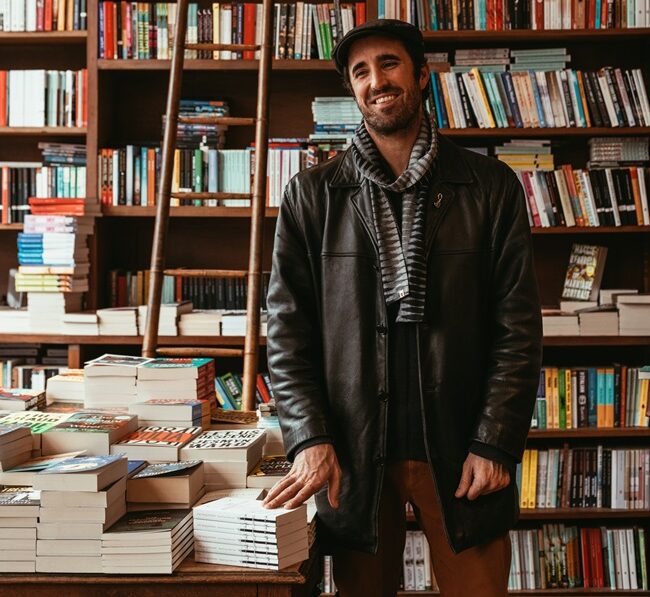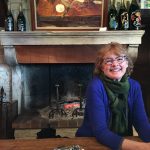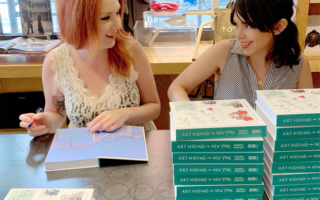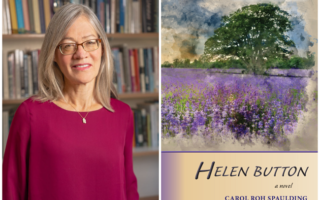Life in Paris: Interview with Samuél Lopez-Barrantes
Samuél Lopez-Barrantes is an American writer, musician, tour guide, and cohost of a literary salon in Paris. He recently took the time to answer Janet Hulstrand’s questions about his life in Paris for Bonjour Paris. Here is their interview.
First, some general background. Where are you from, and how long have you been living in Paris? Also, what brought you here, and what has kept you here?
I was born in a theater commune in the south of France but was raised in Chapel Hill and Durham, North Carolina. In that sense, the French terroir brought me here first, and my affinity for Paris when I visited it as an adolescent. In 2008, I decided to study here for an entire year to immerse myself in the culture and learn the language properly. I lived in an 11-square-meter chambre de bonne on the seventh floor of a 19th century building near the Parc Monceau. My host mother was a luxury hat maker and her husband was a chemist who worked for a perfume specialist … and so my love affair with this city began.
During that year, I fell in love with a Parisian law student and, as I often tell people when I want to quickly summarize what brought me to Paris, I say: I moved to Paris to be in love and write a book; the relationship ended and the novel was shit (nobody has ever seen that book, which is why I think of it as the zero novel, not the first). Sixteen years later, I’m still here, writing books and in love with my wife, the American photographer Augusta Sagnelli, and of course with the City of Light.
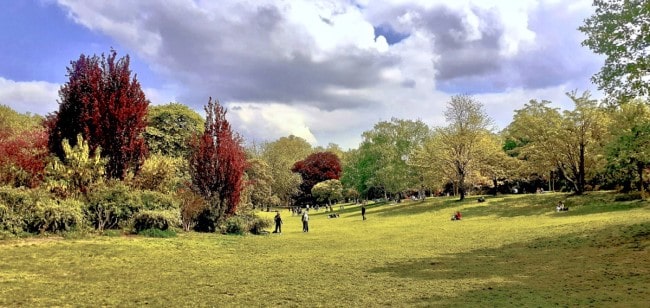
View of the Parc Monceau ©Sarah Fauvel
What do you love most about Paris? What is your favorite thing to do there? And what do you miss about living in the States (if anything)?
Walking. I pay my bills as a literary tour guide, and it’s hard for me to imagine a better profession than being paid to walk around Paris, discussing what makes me tick. There’s something about the act of walking in Paris that liberates the soul from all of the noise (I rarely wear headphones anymore and usually keep my cellphone tucked away in a hard-to-reach pocket, creating the conditions for this ancient city to reveal itself to me in countless ways).
And of course, when my legs are tired, all I have to do is sit a café to have a noisette or a Ricard or a glass of wine or a cold pint. In her 1940 gem of a book, Paris, France, Gertrude Stein said, “The essence of being civilized is to possess yourself as you are.” I’ve never felt more capable of owning up to myself as a human being than in Paris. What I miss most about the States: breakfast sandwiches and watching basketball games live (it’s only ever re-runs in France). But that’s about it.
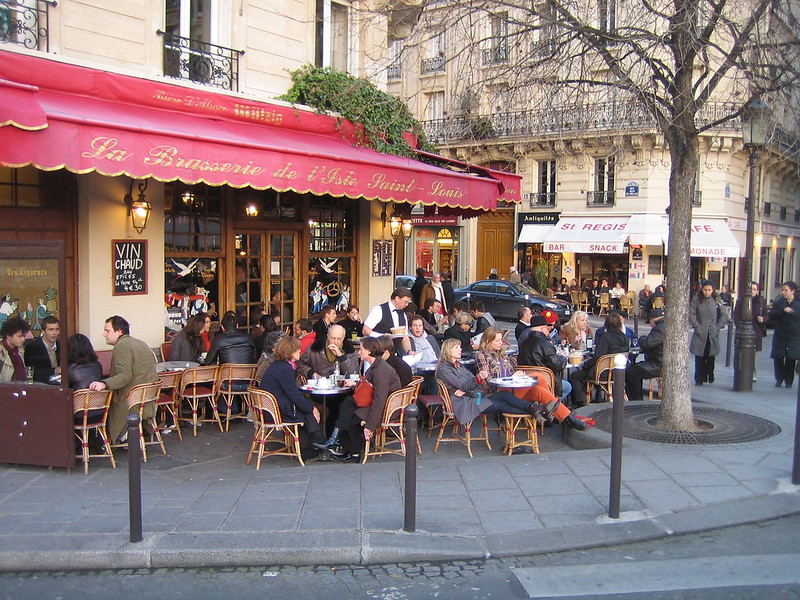
Paris cafe. Photo credit: Pat Guiney/ Flickr
How do your various activities — writing, tour-guiding, making music — fit together? What do you spend most of your time doing? Also, what kinds of tours do you do? Where can readers find your music, and what’s the best way to support you as a musician?
I like to say that when it comes to my professional life, I live a mosaic lifestyle. It took me years to develop the confidence, skill, and network to be able to make most of my money from art in one way or another. In that sense, by writing on Substack, a popular online writing platform for readers and writers, I’m able to earn a bit every month. I have also chosen to retain the rights to my two novels (I bought back the rights to Slim and The Beast in 2022, and started a publishing imprint with my wife to publish The Requisitions last December.) But writing requires inspiration, and being a literary tour guide in Paris is a fantastic inspiration in that sense. My main walks currently on offer are: Hemingway & the Lost Generation (I focus on modernism and the mythology of Hemingway, which blurs the lines of fact and fiction); the Nazi Occupation of Paris (I earned a master’s degree in Holocaust Studies); and general introductions to Paris’s Latin Quarter and Montmartre, with particular emphasis on 20th century intellectual movements (literary modernism, French existentialism, and more obscure theories related to surrealism, situationism, and the reasons why artists still flock to Paris today).
I also cohost a literary salon with the author John Baxter, teach a creative writing workshop at the Sorbonne in the autumns, and have the occasional music gig. I no longer tour like I used to with my former band, Slim and the Beast, but you can still hear our band’s music anywhere music is streamed. If readers are interested in the more impressionistic piano/vocals that I’ve been playing since I stopped playing indie rock, there’s only one place to find my music as of now, and it’s in the “music and film” section of my Substack, if not, Paris.
Given all of the ways I’ve found to pay the rent through the years — I’ve been an English teacher, a glorified receptionist, a journalist working on digital trends (which I hated); a handyman, an online lecturer for Context Travel during the pandemic; a wedding singer; a destitute rock musician; the list goes on… I’ve been able to keep myself occupied with a mosaic of professional outlets that are finally fitting together like puzzle pieces to allow me to focus on writing novels. But, for better and for worse, if you ask me what I spend most of my time doing, it’s getting through all of today’s tasks so that I can write more peacefully tomorrow.
The dream is to have more time devoted to writing (4-5 hours every day instead of 2-3), but that’s why dreams exist — so we can pursue them — which is why I intend to start applying to more artist residencies as I enter the long period of middle age.
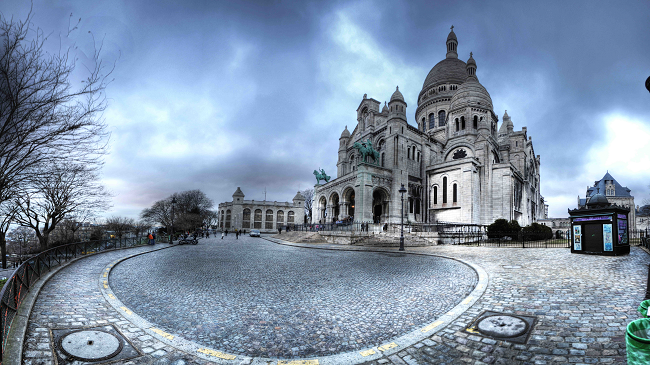
Montmartre, Paris. Photo Credit: Nezar Kadhem/Flickr
I’m particularly intrigued by your Paris Literary Salon. How long has it been going, what is the story behind its creation, what kinds of books do you discuss, who tends to participate, and how can people learn more about it?
John Baxter is first and foremost a good friend, but he also happens to be the most prolific writer I know. He’s published 48 books and counting and is best known for his biographies and nonfiction books about Paris — but he’s also written novels.
Years ago, my friend Oliver Gee interviewed John on his podcast, The Earful Tower, and I reached out to John because he sounded like an interesting person. The rest, as they say, is history. In 2020, John and I decided to create a literary salon to supplement our incomes but also to create a community of like-minded fans of literature and history. When the pandemic hit, we were forced to take our Paris Writers’ Salon online, which turned out to be a blessing, as most of our guests are in the USA. This month we completed our 12th rendition, which covered three books about Montmartre: Simenon’s Inspector Maigret and the Strangled Stripper; Qiu Miajoin’s Last Words from Montmartre; and John’s own book, Montmartre: Paris’ Village of Art and Sin. For each salon, we ask participants to read three books to serve as a springboard for a literary and historical discussion about a unifying theme. For those interested in learning more, or attending a future rendition, you can find information on previous salons and updates here.
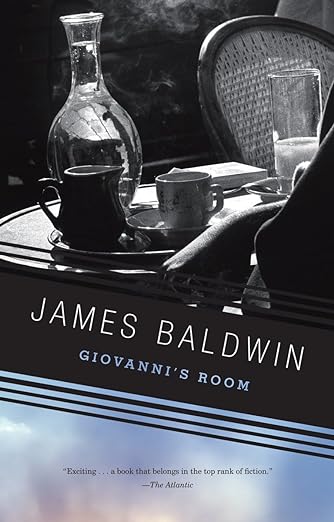
James Baldwin’s “Giovanni’s Room”
What are some of your own personal favorite books about, or set in, Paris? And what are you reading now?
My favorite book set in Paris is James Baldwin’s Giovanni’s Room. I’ve been teaching it in my creative writing workshop at the Sorbonne for the past five years. Simone de Beauvoir’s Les Inséparables was a revelation to me, too, especially because it was only recently published — posthumously — in the early 2020s. I’d be remiss not to mention A Moveable Feast, which is a cliché for the simple reason that it is the most iconic book ever written about Paris, but I have no doubt that Hemingway was inspired by Gertrude Stein’s thoughtful reflections on life before the war in her little-known book, Paris, France. As far as more experimental fiction goes, I loved Louis Aragon’s Paris Peasant, and I also think that Zelda Fitzgerald’s Save Me the Waltz is an underrated time capsule of Paris in the 1920s. As far as nonfiction goes, I am currently reading Nazi Paris by Allan Mitchell, in preparation for a busy tourist season, and am slowly reading (with friends) Friedrich Nietzsche’s Beyond Good and Evil, to investigate early existentialist thought.
For fiction, my main excitement lies in rereading Roald Dahl’s The BFG, and Norton Juster’s The Phantom Tollbooth as I mine my childhood love for literature in preparation for a new novel.
I have just finished reading your new book, The Requisitions, and I was deeply moved by it. It is a sobering look at one of the most difficult subjects of our time: that is, trying to understand how the Holocaust could have taken place; how even good, highly ethical people became complicit in allowing it to happen, and sometimes even participated in carrying it out; and how some of those who suffered through it in one way or another managed to hold onto their humanity through it all. Your story takes the reader into that harrowing process step by step in such a way that it’s impossible not to feel the pain of it all personally. And yet it is not unremittingly grim. What made you want to take on such a subject? And how does it feel to have completed it?
I’ve been fascinated by the history of World War Two ever since I was a child, and in fact, the opening to The Requisitions details that very story. The way my mother tells it, when I was eight years old I climbed up on a bookshelf to pull down a historic book about Nazism and have been obsessed ever since. In some sense, it took me writing The Requisitions to understand why I’ve always been so fascinated by the darker side of the human condition. After years of studying the Holocaust at the University of Vermont and then at University College London for an MA in social theory, I realized that if I believed in telling a story about what I’d learned about human nature, it couldn’t be an academic text — it had to be a novel — and so began the work on The Requisitions with a single sentence that visited me from the depths of academic study in London: “When the sirens began, the professor was sitting at the Astoria Café.”
To say I feel relieved to have finished The Requisitions is a gross understatement, not the least because as I mentioned above, my wife and I decided to create our own imprint, Kingdom Anywhere, to publish it independently last year. The book’s main character is based off of Viktor Frankl, whose existentialist philosophy changed my life. But with such complex and sensitive topics as the Nazi Occupation of Poland, Germany’s mobile killing units, the Jewish Councils of Poland, and the difference between history and memory, I am deeply proud and also relieved to move on to new projects.
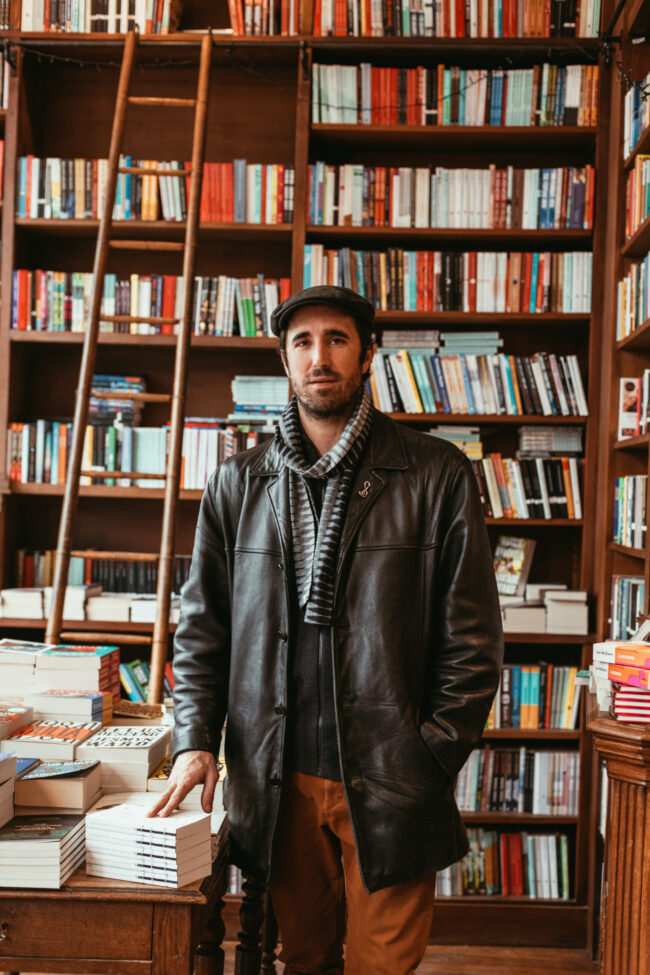
Samuél Lopez-Barrantes at the Red Wheelbarrow Bookstore
What’s next for you as a writer? I know you have another book underway; do you want to tell our readers about it?
My next project is a collaborative one with my wife, Augusta Sagnelli. We exchanged phone numbers in Paris in March, 2020, just a week before the world began to change irrevocably; but after Augusta returned to New Orleans, where she was working at the time, we began exchanging text messages — more than 400,000 words over the next five months, to be precise. As we fell hopefully in love from across an ocean, we decided to see if our connection was digitized-love or actually authentic, deciding to meet in August 2020 on the curb of Newark International Airport to test-out a first kiss. Six months later, we were married, and now we live in Paris together, so that’s the next project — telling our story — which is really more about compiling and editing text messages than writing anything new. As for a fourth novel, I’m returning to my childhood favorites for inspiration, but that’s all I can know for now…
Lead photo credit : Samuél Lopez-Barrantes at the Red Wheelbarrow Bookstore
More in author, books, Interview, People of Paris
